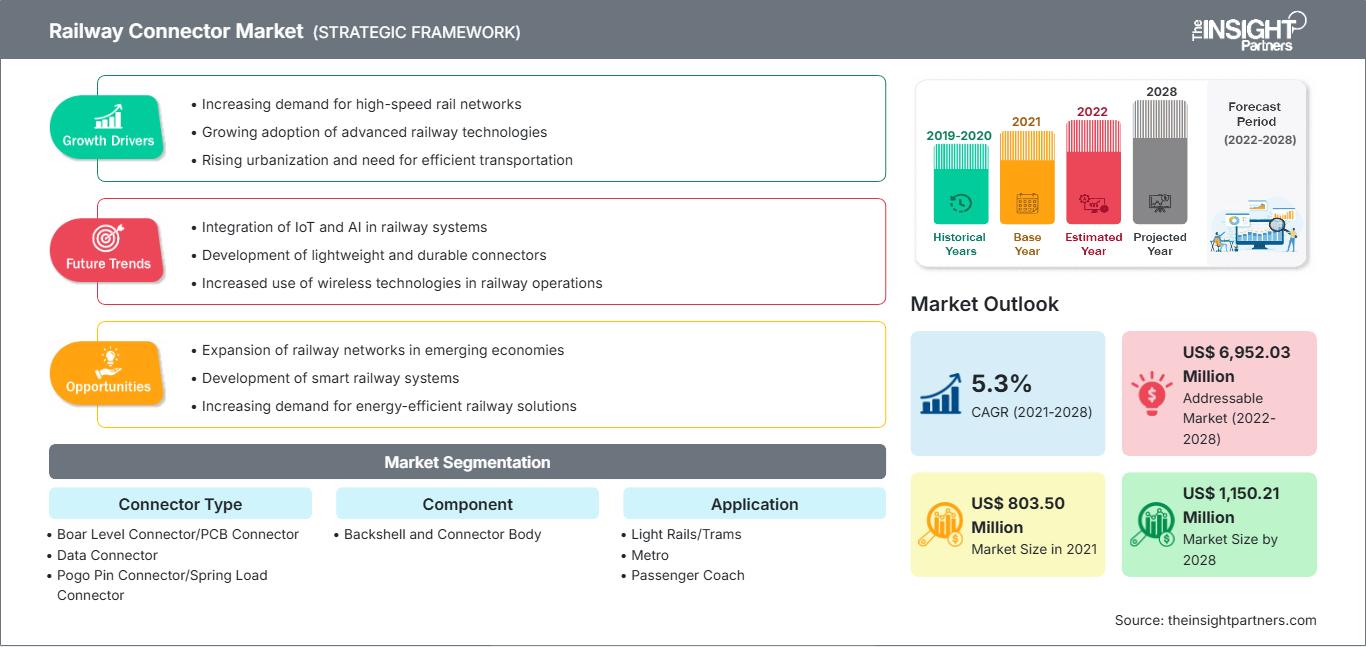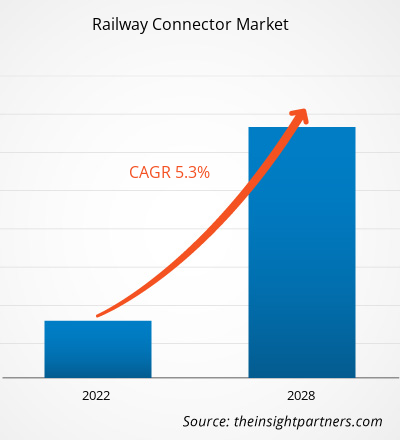Railway Connector Market Size and Competitive Analysis by 2028
Railway Connector Market Forecast to 2028 - COVID-19 Impact and Global Analysis By Connector Type (Boar Level Connector/PCB Connector, Data Connector, Pogo Pin Connector/Spring Load Connector, Power Connector, and Others), Component (Backshell and Connector Body), and Application (Light Rails/Trams, Metro, Passenger Coach, and Others)
Historic Data: 2019-2020 | Base Year: 2021 | Forecast Period: 2022-2028- Report Date : Feb 2022
- Report Code : TIPRE00007460
- Category : Electronics and Semiconductor
- Status : Published
- Available Report Formats :


- No. of Pages : 156
The railway connector market is expected to grow from US$ 803.50 million in 2021 to US$ 1,150.21 million by 2028; it is estimated to grow at a CAGR of 5.3% from 2021 to 2028.
Growing population, changing lifestyle, and rapid urbanization require an interconnectivity railway communication systemand driving the market growth. Moreover, increasing data rates and rising miniaturization trend in electronic devices drive developments in compact, robust, and high-speed communication solutions. The emergence of digital transmission networks on railways offers manufacturers with the challenge of developing system concepts and equipment interfaces which is suitable for complex data communication. Many European vehicles are equipped with high technologies, such as wireless data transmission, which is expected to propel the demand for railway connectors for complex data communication in Europe during the forecast period.
Customizee This Report To Suit Your Requirement
Get FREE CUSTOMIZATIONRailway Connector Market: Strategic Insights

-
Get Top Key Market Trends of this report.This FREE sample will include data analysis, ranging from market trends to estimates and forecasts.
Impact of COVID-19 Pandemic on Railway Connector Market
In 2020, the COVID-19 pandemic created a large-scale negative impact on global economies. The pandemic led to many challenges across various markets, such as the railway connector market. The demand and supply were majorly reduced due to low production. Further, the railway industry was negatively impacted due to lockdown. The restrictions on the supply chain created a halt in the manufacturing of railway connectors across the globe. However, the outlook for railway projects remained buoyant in 2021. Therefore, the demand for railway connectors has increased from 2021.
Market Insights – Railway Connector Market
Emergence of Driverless Trains to Propel Railway Connector Market during Forecast Period
Increasing electrification across the global transportation industry irrespective of the mode of transport has led to the development of automated transport methods. Trains are the frontrunners of transport automation after road transport, as autonomous driving is making its entry into the railway sector. In Europe, automatic train operation (ATO) is becoming the latest trend that modernizes the region's railway sector. In October 2019, six German companies, led by Siemens Mobility, started a joint project named “AStriD.” The growing urban and local transport propels the need to integrate advanced and automated systems in rail to optimize train operations. Therefore, increasing demand of connectors in autonomous trains offers advantages to the players operating in the railway connector market.
Connector Type-Based Insights
Based on connector type, the railway connector market is segmented into broad level connector/PCB connector, data connector, pogo pin connectors/spring load connector, power connector, and others. The broad-level connector/PCB connector segment held the largest market share in 2021.
Players operating in the railway connector market are mainly focused on developing advanced and efficient products.
- In January 2021, Fischer Connectors Group started the construction of a new manufacturing facility in Portugal.
- In June 2021, TT Electronics' AB Connectors became gold members of rail forum Midlands.
Railway Connectors
Railway Connector Market Regional InsightsThe regional trends and factors influencing the Railway Connector Market throughout the forecast period have been thoroughly explained by the analysts at The Insight Partners. This section also discusses Railway Connector Market segments and geography across North America, Europe, Asia Pacific, Middle East and Africa, and South and Central America.
Railway Connector Market Report Scope
| Report Attribute | Details |
|---|---|
| Market size in 2021 | US$ 803.50 Million |
| Market Size by 2028 | US$ 1,150.21 Million |
| Global CAGR (2021 - 2028) | 5.3% |
| Historical Data | 2019-2020 |
| Forecast period | 2022-2028 |
| Segments Covered |
By Connector Type
|
| Regions and Countries Covered |
North America
|
| Market leaders and key company profiles |
|
Railway Connector Market Players Density: Understanding Its Impact on Business Dynamics
The Railway Connector Market is growing rapidly, driven by increasing end-user demand due to factors such as evolving consumer preferences, technological advancements, and greater awareness of the product's benefits. As demand rises, businesses are expanding their offerings, innovating to meet consumer needs, and capitalizing on emerging trends, which further fuels market growth.

- Get the Railway Connector Market top key players overview
The railway connector market is segmented on the basis of connector type, component, application, and geography. Based connector type, the market is segmented into broad level connector/PCB connector, data connector, pogo pin connectors/spring load connector, power connector, and others. In 2021, the broad level connector/PCB connector segment led the market and accounted for the largest market share. Based on component, the market is bifurcated into backshell and connector body. In 2021, the connector body segment led the market and accounted for a larger market share. Based on application, the railway connector market is segmented into light rail/trams, metro, passenger coach, and others. In 2021, the others segment led the market and accounted for the largest market share. Geographically, the market is broadly segmented into North America, Europe, Asia Pacific (APAC), the Middle East & Africa (MEA), and South America (SAM). In 2021, APAC accounted for a significant share in the global railway connector market.
Amphenol Corporation, Kyocera-AVX, Fischer Connectors SA, Harting Technology Group, Molex, LLC (Koch Industries, Inc.), Schaltbau GmbH, Allied Electronics Corporation, Smiths Interconnect, TE Connectivity Corporation, and TT Electronics are among the key players that are profiled during this market study. In addition, several other essential market players were studied and analyzed to get a holistic view of the railway connector market and its ecosystem.
Frequently Asked Questions
Naveen is an experienced market research and consulting professional with over 9 years of expertise across custom, syndicated, and consulting projects. Currently serving as Associate Vice President, he has successfully managed stakeholders across the project value chain and has authored over 100 research reports and 30+ consulting assignments. His work spans across industrial and government projects, contributing significantly to client success and data-driven decision-making.
Naveen holds an Engineering degree in Electronics & Communication from VTU, Karnataka, and an MBA in Marketing & Operations from Manipal University. He has been an active IEEE member for 9 years, participating in conferences, technical symposiums, and volunteering at both section and regional levels. Prior to his current role, he worked as an Associate Strategic Consultant at IndustryARC and as an Industrial Server Consultant at Hewlett Packard (HP Global).
- Historical Analysis (2 Years), Base Year, Forecast (7 Years) with CAGR
- PEST and SWOT Analysis
- Market Size Value / Volume - Global, Regional, Country
- Industry and Competitive Landscape
- Excel Dataset
Recent Reports
Related Reports
Testimonials
The Insight Partners' SCADA System Market report is comprehensive, with valuable insights on current trends and future forecasts. The team was highly professional, responsive, and supportive throughout. We are very satisfied and highly recommend their services.
RAN KEDEM Partner, Reali Technologies LTDsI requested a report on a very specific software market and the team produced the report in a few days. The information was very relevant and well presented. I then requested some changes and additions to the report. The team was again very responsive and I got the final report in less than a week.
JEAN-HERVE JENN Chairman, Future AnalyticaWe worked with The Insight Partners for an important market study and forecast. They gave us clear insights into opportunities and risks, which helped shape our plans. Their research was easy to use and based on solid data. It helped us make smart, confident decisions. We highly recommend them.
PIYUSH NAGPAL Sr. Vice President, High Beam GlobalThe Insight Partners delivered insightful, well-structured market research with strong domain expertise. Their team was professional and responsive throughout. The user-friendly website made accessing industry reports seamless. We highly recommend them for reliable, high-quality research services
YUKIHIKO ADACHI CEO, Deep Blue, LLC.This is the first time I have purchased a market report from The Insight Partners.While I was unsure at first, I visited their web site and felt more comfortable to take the risk and purchase a market report.I am completely satisfied with the quality of the report and customer service. I had several questions and comments with the initial report, but after a couple of dialogs over email with their analyst I believe I have a report that I can use as input to our strategic planning process.Thank you so much for taking the extra time and making this a positive experience.I will definitely recommend your service to others and you will be my first call when we need further market data.
JOHN SUZUKI President and Chief Executive Officer, Board Director, BK TechnologiesI wish to appreciate your support and the professionalism you displayed in the course of attending to my request for information regarding to infectious disease IVD market in Nigeria. I appreciate your patience, your guidance, and the fact that you were willing to offer a discount, which eventually made it possible for us to close a deal. I look forward to engaging The Insight Partners in the future, all thanks to the impression you have created in me as a result of this first encounter.
DR CHIJIOKE ONYIA MANAGING DIRECTOR, PineCrest Healthcare Ltd.Reason to Buy
- Informed Decision-Making
- Understanding Market Dynamics
- Competitive Analysis
- Identifying Emerging Markets
- Customer Insights
- Market Forecasts
- Risk Mitigation
- Boosting Operational Efficiency
- Strategic Planning
- Investment Justification
- Tracking Industry Innovations
- Aligning with Regulatory Trends




















 Get Free Sample For
Get Free Sample For